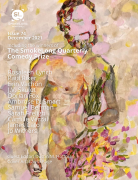The story takes the form of writer’s guidelines, and I see a world-weariness in play. What’s your biggest submission pet peeve?
It’d probably have to be the exact thing that this piece is aping—too much “creativity” in the call for submissions. Maybe I’m boring (I am), but when I’m reading a journal’s FAQ, I’m there for logistics: word count, genre considerations, etc. The plumbing, in other words—the purely schematic info. I can (and should) gather what the journal is looking for in terms of tone, voice, thematic interests, etc., from the actual work that they’ve published (which, of course, is why you should read any journal you submit to before actually submitting to that journal!).
On the other hand: What do I know? Every journal is different, and a super voicey FAQ may suit a particular journal’s style. Cool! But I only like a little flavor in my submission guidelines. A La Croix amount of flavor, if you will.
What’s one piece of real talk you could share with a newbie writer? I mean the best advice they won’t hear in English 215.
I’ll repeat the only consistent advice I’ve ever gotten as a writer: You have to read a lot and write a lot. That’s it; that’s the “secret” that in fact is no secret at all.
The secret behind the secret, however, is that what constitutes “a lot” can be literally anything you want it to be. Anything! That includes genre stuff. That includes stuff that isn’t “canon.” That even includes video games, TV, movies, comic books, whatever. All of that stuff is art and therefore consuming any of that stuff counts as reading. And if you’re reading, and reading in the headspace of a “writer” (whatever that may mean to you), then you’re doing writerly work.
I love the structure of this piece—thick parody culminating in a paragraph of real tenderness about the father. Could you share some of your process to get to the payoff?
It’s funny you call that paragraph “tender,” because I tried to write it as almost overwhelmingly cliché—dad, cancer, boat, fish; these are all things we’ve read in (good, bad, and perfectly OK) stories before. There’s nothing particularly fresh in the way the dad is described—beard, blue eyes, “affable,” which is an adjective I’ve never really liked, to me it’s just a dressier way of saying “nice.”
I guess I was thinking less about the content of that paragraph and more about the length and the way it actually appears on the page. I.e.: Most of the piece is quicker jokes, which makes that penultimate paragraph a pretty big contrast and change of pacing for the reader. I figured I could emphasize that contrast even further by altering the voice, as well. I could then contrast further still by altering the content—which, in this case, meant conventionally-literary Cancer Dad. All this leads to (what I hope is!) a pretty big turn for the piece to take, which then of course leads to the one-sentence punchline that concludes the piece (the “simultaneous submissions” gag).
Who’s the most amazing story writer operating today?
Absolutely impossible to choose only one, so I will refuse to (also this is only my opinion and there are so many amazing story writers, so what do I know!) Instead I’ll give a few: in quote Literary Fiction endquote I’ll say Charles Yu, Laura van den Berg, and Diane Cook. Outside of that, I’d like to mention Jon Bois, whose work with SB Nation is legitimately some of the greatest multi-media non-fiction storytelling that’s ever been crafted, sports-centric or otherwise.
Let’s say you can do things better. Invent a litmag; give it a name and a theme.
The Mad About You Review. We would only accept work related to the 1990s situational comedy Mad About You, starring Paul Reiser and Helen Hunt. We would be very strict about this; no other Reiser- or Hunt-tangential work would be accepted or even considered (i.e.: My Two Dads, Twister, etc.) The tone would be very somber. Almost icky. Bordering on unpleasant.
Also I almost certainly can’t do things better.



 The SmokeLong Grand Micro Contest (The Mikey) is now an annual competition celebrating and compensating the best micro fiction and nonfiction online.
The SmokeLong Grand Micro Contest (The Mikey) is now an annual competition celebrating and compensating the best micro fiction and nonfiction online.